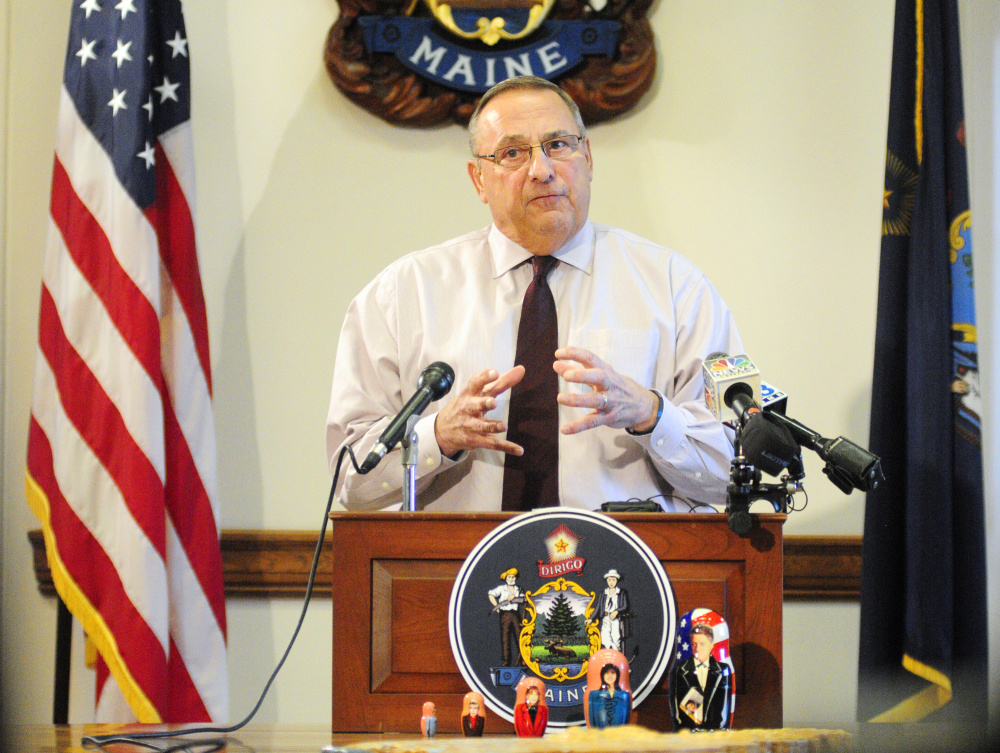Gov. Paul LePage said Thursday that two leaders of a referendum on raising the minimum wage in Maine should be jailed, echoing comments by Republican presidential nominee Donald Trump about jailing his political rival.
LePage’s comment, made during a speech urging voters to reject Questions 1 through 5 on the Nov. 8 ballot, came just four days after Trump stirred controversy by saying that if he were elected he would appoint a special prosecutor to investigate his opponent, former Secretary of State Hillary Clinton, and possibly jail her.
LePage, speaking to the Lewiston-Auburn Metropolitan Chamber of Commerce, said Mike Tipping and Ben Chin, both officials with the Maine People’s Alliance, should be jailed because increasing the minimum wage will lead to higher prices and potentially harm elderly residents on fixed incomes. The alliance is a progressive organization that frequently backs Democratic initiatives and is one of the major groups pushing for a stepped increase in the minimum wage, which will rise to $12 an hour by 2020 if voters approve the question.
“Frankly, those people (Tipping and Chin) should be sent to jail for what they’re doing to the elderly,” the Republican governor said.
The head of the American Civil Liberties Union of Maine said the suggestion that political opponents should be jailed “is rare, if not unprecedented” in American politics.
“In the United States, we don’t lock people up for having different political views,” said Alison Beyea, executive director of the ACLU of Maine. “The beauty of democracy is that all people get to participate – not just the ones in power.”
Brendan Nyhan, a professor of government at Dartmouth College, worries about the effect such threats could have on the nation’s democracy.
“I worry about criminalizing political differences,” he said. “Suggesting that your political opponents should be jailed is destructive and anti-democratic rhetoric.”
The targets of LePage’s statement largely dismissed the idea that promoting a referendum measure that the governor opposes would land them in a prison cell.
“This is my one phone call,” Tipping joked when responding to a request for his reaction to LePage’s remarks. “This is part of a pattern where the governor says something extreme in an attempt to get people, to get the media, to pay attention to his lies.”
‘A NEW LOW FOR DEMOCRACY’
He also referred to the threat made by Trump – whom LePage has endorsed – to appoint a special prosecutor to investigate Clinton if he wins the election.
“It’s also pretty disturbing that we hear politicians call for jailing their political opponents. This is a new low for democracy,” said Tipping, a political blogger who formerly wrote for the Portland Press Herald.
Chin said the governor’s call for the pair to be arrested was an empty threat.
“The governor is all bark and no bite,” Chin said. “He wakes up in the morning figuring out how he can embarrass himself, his party and the state.”
Chin said many elderly Mainers work part-time jobs at hourly wages to supplement their income, and raising the minimum wage would help, not hurt, those older workers.
LePage used the speech to a mostly friendly audience of business leaders to urge “no” votes on the five citizen-initiated referendum questions on the ballot. He bemoaned “government by referendum,” saying the ballot measures reduce “complex issues” to “small questions.”
He said he will send the Legislature a state budget proposal that slashes income tax rates if voters approve Question 2, which calls for a 3 percent income tax surcharge on earnings above $200,000 to provide more money for education.
LePage argued that referendum questions can’t direct money to a specific program and that the revenues would have to flow into the state’s General Fund.
John Kosinski, campaign manager for Yes on Question 2, said LePage is wrong and that the money can be directed to what he called “a rainy day fund for schools.”
OPPOSITION TO EDUCATION SURCHARGE
LePage also said most school districts in the state wouldn’t benefit from the fund, and that most of the money would flow to wealthy towns such as Cape Elizabeth and Falmouth, while others, such as Lewiston, would get nothing.
Kosinski challenged that assertion as well, saying Lewiston would receive about $4 million in additional education aid if the referendum proposal passes, and that other communities also would benefit.
If the measure is approved, LePage said, he will send a budget to lawmakers in January that would slash income tax rates to 4 percent, so the 3 percentage point surcharge would still keep the top rate below the current maximum of 7.15 percent.
“I’ll let the Legislature fight it out,” he said.
The surcharge, he said, would lead more Mainers to set up residency in other states with lower, or no, state income tax.
He also urged the Lewiston-Auburn chamber members to reject an increase in the state’s current minimum wage of $7.50 an hour. He said the increase would only affect about 14,500 Mainers who currently make the minimum wage or less, and that group consists largely of restaurant servers and disabled people.
LePage said the tipped credit – a lower minimum wage for tipped workers that is currently $3.75 an hour, as long as they make the minimum wage when tips are figured in – would go away if the proposal passes.
Actually, the measure calls for the tipped credit to be gradually increased to $12 an hour. This part of the referendum has been opposed by many restaurant owners, who say it could lead them to eliminate tipping in their establishments and instead raise prices to make up for having to pay workers a higher minimum wage.
LePage said that would hurt Maine restaurant workers like his wife, Ann, who took a job as a waitress in a Boothbay Harbor restaurant last summer to, she said, make money for a new car. LePage said his wife averaged $30 an hour at the job, with tips.
He also said the higher minimum wage would hurt about 6,000 people with what he called “pronounced disabilities” who work hourly jobs to help support themselves.
“The folks are happy people and they’re going to get kicked to the curbside,” he said.
LAWSUIT IF MARIJUANA LEGALIZED
LePage also said he would mount a court challenge if voters approve recreational use of marijuana for those over 21.
Because he takes an oath to uphold state and federal laws – under which marijuana use, possession and sale is illegal – LePage said he could be impeached if he allowed the law to take effect.
Those who have called for LePage’s impeachment for other matters, he said, including a threat to withhold state funds for a private school that planned to hire the Democratic speaker of the Maine House, or because of racially charged remarks he has made, could move to impeach him for violating his oath if police didn’t enforce federal marijuana laws, he said.
On Thursday night, LePage posted a video of himself on his Facebook page in which he outlines his opposition to the marijuana referendum, Question 1.
The other controversies, LePage said, involve “just words,” which are constitutionally protected, even though he admitted that his language skills were poor and his grandmother would have likely made him “chew” soap for some of his remarks.
On marijuana, LePage said, without offering specific information, that a woman had “overdosed” on the drug, and that a man who had used marijuana jumped to his death because “he was so high, he thought he could fly.”
Asked for details Thursday afternoon, LePage’s office pointed to a 2014 case in Colorado in which a man consumed more than the recommended amount of a cookie that contained marijuana and jumped off a balcony. An autopsy said marijuana intoxication was “a chief contributing factor” in the death. LePage’s office didn’t immediately provide any more details on the woman’s overdose.
‘SOCIAL ENGINEERING’ on GUN SALES
LePage also said pets could die if they ate baked goods, such as brownies or cookies, that contain marijuana. Using marijuana in baked goods, instead of smoking it, is a favored way of ingesting it in states where recreational use of the drug has been legalized.
As an aside, LePage told the crowd that he wanted to adopt two more dogs in addition to the Jack Russell terrier his family adopted in May and named “Veto.” He said the additional dogs would be named “Sustained” and “Override.”
LePage also said Mainers should reject background checks for private gun sales, saying the referendum proposal represented an attempt at “social engineering” backed by wealthy out-of-staters. And the final ballot question, ranked-choice voting, in which voters can specify their second-, third- and other ranked choices in a system called “instant runoffs,” is probably unconstitutional, the governor maintained, because it violates the principle of one person, one vote.
The city of Portland has had a ranked-choice voting system for choosing its mayor since the 2011 municipal election, and versions of the system have been used in other municipalities in eight other states.
LePage didn’t say where he stood on Question 6, which asks voters if they support a $100 million bond for infrastructure projects.
Send questions/comments to the editors.






Comments are no longer available on this story